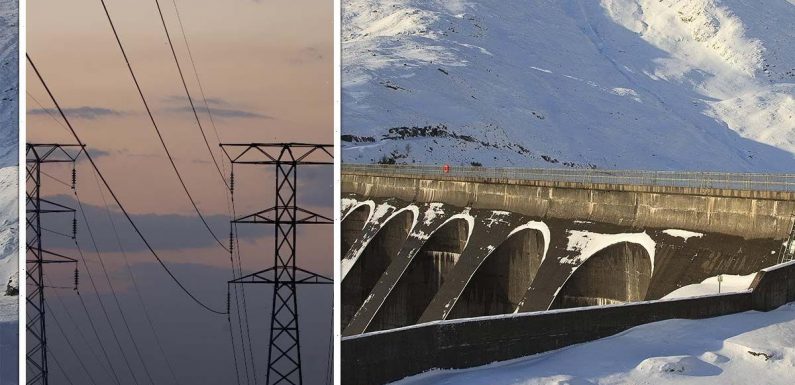
Countryfile: Pig farmer explains energy needs of breeding pigs
We use your sign-up to provide content in ways you’ve consented to and to improve our understanding of you. This may include adverts from us and 3rd parties based on our understanding. You can unsubscribe at any time. More info
Britain’s plans to tackle the energy crisis have been dealt a major blow, as Government delays have affected two major clean energy projects that could power a million homes once finished. Currently, the country is facing a major fossil fuel energy crisis, as the soaring wholesale cost of gas has sent household bills spiralling, while increased competition for energy supply has meant that the UK is scrambling to secure additional supplies of power this winter. As a result, the Government has been looking to boost the UK’s energy security, through an increase in renewable electricity generation through new wind and solar farms, along with new nuclear plants.
Another such renewable resource that the UK could be harnessing is hydropower from rivers, which experts like Pascal Radue, CEO and President of Hydro Solutions and General Electric have hailed as “the biggest renewable energy resource that we have on the planet”.
While hydropower from the Scottish Highlands has enough potential to generate electricity to power millions of homes, two large-scale projects are reportedly facing delays after getting stuck in Government red tape.
Drax Group Plc and SSE Plc, two energy giants, are currently seeking approval for their revenue-sharing model before building hydropower plants that would turn local lakes into giant storage batteries.
These sites will be able to store and generate about 2 GW of hydropower and will be able to supply the National Grid during times of high demand, which could prevent blackouts.


Under their proposal submitted to the Department for Business, Energy and Industrial Strategy, the two companies would spend £2billion combined on these projects.
However, according to the National, the Government only plans to make a decision on these sites by 2024, which means that construction will not be completed until 2030, as it could take about six years to build.
Alex Campbell, head of research and policy at the International Hydropower Association, an industry group said: “We’ve got an energy emergency here, and we need to get cracking on these things. This is a chance to show the UK can think seriously about these long-term, difficult challenges.”
The energy giants’ financing model, which is called cap and floor, guarantees that the companies receive a minimum annual income, even if the taxpayers have to directly pay for it.


On the other hand, the model also caps the profits that the energy firms can receive, before the bounty is fed back to the Treasury. This comes as energy companies have been slammed for making record windfall profits in the past year as energy bills become unaffordable for millions.
Such a model helps investors by essentially guaranteeing that they will see a minimum return on their investment in the massive renewable energy project.
Ian Kinnaird, Drax’s Scottish assets director said: “It protects consumers and allows us flexibility. We need the support to de-risk it for our investors.”
Meanwhile, Selby, a British firm is looking to double the capacity of its existing hydropower plant at Ben Cruachan, a mountain overlooking a 90-metre-deep lake. In order to build Cruachan 2, Drax will reportedly spend £500million, and take as long as six years to complete the site.
DON’T MISS:
UK risks losing £4-5bn worth of cheap energy [INSIGHT]
COVID-19 lab leak theory blown wide open as email chain exposed [REPORT]
Russia set to strike new nuclear deal with India in major investment [REVEAL]

Meanwhile, SSE is looking to spend a staggering £1.5billion on its larger Coire Glas project, which will have a potential capacity of up to 1500MW and is expected to be the first large-scale pumped storage scheme to be developed in the UK for more than 30 years
The site was given the green light by the Scottish Government after the company took steps like tagging local golden eagles to study the potential impact on their behaviour.
A spokesperson for the Scottish Government said that Scotland has consistently called on Westminister to adopt a financing mechanism that would encourage hydropower.
Express.co.uk has reached out to the Department for Business, Energy and Industrial Strategy for comment.
Source: Read Full Article